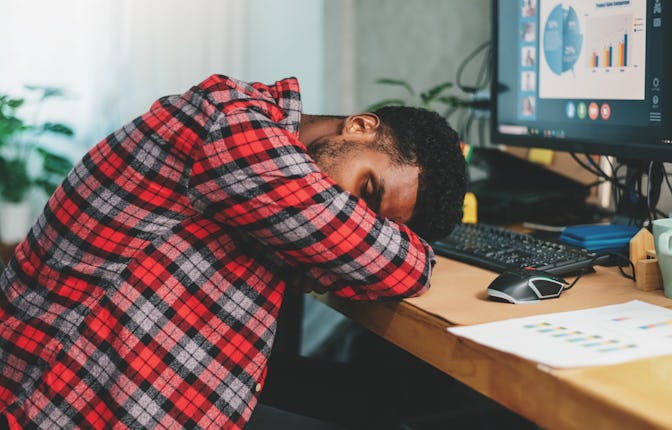Your job's benefits policy could actually kill you
A new study suggests that not having paid sick time results in increased mortality.

This article contains mentions of suicide. If you or a loved one are struggling, contact the National Suicide Prevention Lifeline.
While it may seem like common sense that our jobs dramatically impact our quality of life, it turns out that our jobs may also determine how long we live. Sure, that’s obvious when you’re thinking about high-risk professions — like, say, lumberjacking — but a new study suggests that basically any job can be detrimental to your longevity if you don’t have paid sick leave.
This new research, which was published today in the American Journal of Preventive Medicine, looked at the mortality rates of working-aged people in the U.S. over the course of ten years, from 1999 to 2019. Researchers analyzed mortality data collected by the C.D.C. for people aged 25-64 and looked for associations between death counts, paid sick time, and minimum wage requirements.
What they found was that in places where state laws prevented local governments from enforcing policies to protected workers’ minimum wages and access to paid sick time, the mortality rate increased by 6%. So, even if someone lives in a city that’s trying to establish fair working conditions, if the state steps in to prevent local governments from doing so — by establishing “preemption laws” — people are 6% more likely to die.
“State preemption laws that protect profits over people may be shortening the lives of working-age Americans,” Jennifer Karas Montez, PhD, a Sociology professor at Syracuse University and co-author of the study, said in a news release. Montez also said she was surprised how much of an effect paid sick leave policies had on mortality rates. In some counties, people without paid sick time were up to 7.5% more likely to die.
Among those without paid sick leave who died early, the study found that suicide, homicide, and alcohol-related deaths were the culprits. The specific causes of death seemed differ by gender assignment — men without paid sick time were more likely to die by suicide or homicide, while women without paid sick time were more likely to die from alcohol-related deaths or homicide.
According to the research, not having paid sick leave increases the possibility that people will sacrifice pay or even lose their jobs when they need time to recover from an illness which, in turn, can lead to an increased likelihood of suicide, drug use, and other risky behaviors. The researchers also noted that making people go to work when sick puts their co-workers at risk, too.
While this research may not be surprising, it is important — not only does it add to a growing body of research about labor and mortality, but it also highlights the reality that labor policy has a giant impact on our health.
“The consequences of preemption laws stymie local government innovation, constrain opportunities to earn a living wage and take time off of work for medical care without financial repercussions, elevate the risk of death among infants and working age-adults, and contribute to geographic disparities in mortality,” Douglas Wolf, PhD, a professor of Public Administration and International Affairs at Syracuse University and lead author of the study, said in the news release. Let’s all just hope that the labor movement can affect policy fast enough to save our lives.